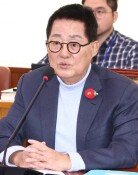Fed determined to take austerity measures despite sufferings
Fed determined to take austerity measures despite sufferings
Posted August. 29, 2022 07:48,
Updated August. 29, 2022 07:48
Federal Reserve Chair Jerome Powell reaffirmed his strong determination to raise interest rates in an address at the Jackson Hole Economic Symposium last Friday, adding that any failure of price stability will bring about greater consequences than the pains that we may suffer of trying to keep prices stable for some time. He mentioned “inflation” as many as 45 times during the speech. He assessed that former Fed Chair Paul Volcker’s successful attempts to curb inflation in the early 1980s came after 15 years’ failures of keeping prices low, arguing that the Fed will keep at it.
Powell’s message runs against U.S. economic circles’ expectation that the Fed will increase interest rates at a slowed pace. Right after his speech, the three major NYSE indices - S&P 500, Dow Jones Industrial Average, and Nasdaq Composite – dropped by more than three percent while cryptocurrency prices dropped as well. This week, the global capital market including South Korea will likely be affected by Powell’s implication. In fact, he made it clear that the Federal Reserve will continue to increase interest rates to “bring inflation (currently in the eight percent range) back down to the two percent goal,” in effect, signaling a possible giant step to raise interest rates by 0.75 percent points at once. Given this, interest rates will highly likely go up from the current levels of 2.25-2.50 percent to 4 percent within this year.
Last week, the Bank of Korea raised the key interest rate for four consecutive times for the first time in history but it was only an increase of 0.25 percent points. However, if it raises interest rates by the same degree twice this year, it will only arrive at three percent to become lower than the U.S. key interest rate by one percent point. BOK Governor Rhee Chang-yong confirmed that spikes in the won-dollar exchange rates will not likely put the national economy at risk. However, there is a growing chance that overseas capital will leave the country, meaning that South Korea will be pushed into a dead end following the rise of U.S. interest rates.
What’s worse, China, South Korea’s largest trading partner, has seen the comeback of COVID-19 with factories going offline due to the power crunch amid severe draught. It is expected that China will grow 2.8 percent this year – only half the target of 5.5 percent. A slower Chinese economy translates into South Korea’s lower export performance. If South Korean businesses have to pay more for raw materials from overseas due to the higher won-dollar exchange rates boosted by the rises in the U.S. interest rates, the country’s balance of trade will only be aggravated over time.
As the U.S. Fed has delivered a clear message to put the brakes on inflation despite some pain, the South Korean economy will inevitably see the consequences. The South Korean government is supposed to spend less budget not to drive inflation upward while accelerating structural reform along with regulation innovation to take another leap forward. The Bank of Korea should not be blinded by a hasty optimist view but nip issues in the bud in advance before it’s too late.







